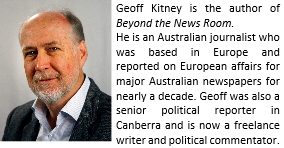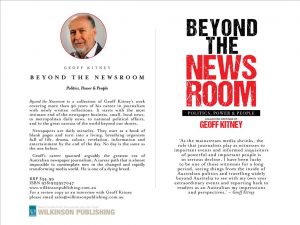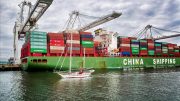The right-wing agenda backed by Rupert Murdoch’s media machine in Australia is changing the face of public discourse, writes Geoff Kitney.
Australia recently marked the birthday of one of its most extraordinary politicians, former Labor Prime Minister Paul Keating.
Keating, now 80, left office in 1996, in a landslide defeat which ushered in a long period of conservative rule. But nearly three decades on, Keating’s light still shines vividly in Australian political history. He was, arguably, the most dynamic politician Australia has seen.
During eight years as Australia’s chief economic minister and five years as Prime Minister, Keating presided over a transformation of the Australian economy and was on the way to transforming Australia’s place in the world. Had he won another term in office, Australia may well have severed its ties with the British crown and become a republic.
Keating’s policies turned Australia from a closed, highly regulated economy to one of the most liberal and open in the world. Working in partnership with Australia’s most popular prime minister, Bob Hawke, Keating floated the currency, deregulated and privatised many aspects of the domestic economy and shifted Australia’s economic focus from its old markets in the Anglo world to its place in Asia. As Prime Minister he pursued a progressive agenda at the heart of which was the goal of reaching an historic settlement with Australia’s indigenous population.
Keating, in partnership with larrikin Prime Minister Hawke, set a course no previous centre-left government had taken, a shift that was followed in the United Kingdom by Labour’s Tony Blair and which became known as “The Third Way”. This, in effect, was a middle course between the old left and right of politics. Blair spent time in Australia observing the Hawke-Keating government and embraced many of its features on the way to his electoral triumphs.
It is a cruel irony that, on the eve of his landmark birthday, Keating witnessed the bitterly divisive debate over whether Australia should give constitutional recognition to its indigenous people. This ended in the defeat of a referendum intended to amend the constitution to bring this about and unite the nation.
Three decades after Keating promised a more liberal, more progressive and more cohesive Australia, the Voice Referendum – as it became known – revealed a bitterly divided nation, ripped apart by intense “culture wars”, with Opposition conservative parties embracing many elements of Donald Trump’s US agenda.
In the past decade, conservative forces have made major gains in finding media platforms sympathetic to and ready to promote their agenda
Significantly, conservative politicians – the Liberal and National parties – now have the powerful Murdoch media empire backing them. Rupert Murdoch’s news outlets – print newspapers, on-line news and television – are in favour of the right-wing agenda being pursued by the conservative parties. Another deeply conservative Australian billionaire – Kerry Stokes – also has influential media assets, including the major national Seven Television network.
And a significant far-right minor party, One Nation – which has a balance of power role in the Australian Senate – is being backed by another immensely rich Australian – Gina Rinehart, owner of the huge Hancock mining conglomerate.
In the past decade, conservative forces have made major gains in finding media platforms sympathetic to and ready to promote their agenda.
Had Keating faced such a hostile media it is unlikely he would have implemented his agenda.
The shift in media weight to the conservative and right wing has been ringing alarm bells for years.
Two former prime ministers – Labor’s Kevin Rudd and the Liberal Party’s Malcolm Turnbull – have taken strong public stands on the issue, especially the partisan shift by the Murdoch media. Both have warned in strong terms of what they see as the threat to democracy of Murdoch’s Australian outlets acting, in effect, as the propaganda arm of the conservative parties.
Most outrageous is Murdoch-owned Sky News which mimics Murdoch’s US Fox News network in its blatant support of right-wing parties. Sky Media played a leading role as a platform for the ‘No’ campaign in the referendum on constitutional recognition of the Aboriginal population. This included blatantly racist commentary.
The wider Murdoch media group in Australia is rabidly pro-business and anti-union. It campaigns against what it terms “wokism” (picked up from the Trump right in the US), questions the impact on Australia of multi-culturalism and debunks climate change science and action to reduce greenhouse gas emissions.
It also gives platforms for nationalistic issues such as a bitter debate over the politics of Australia Day (January 26), the date Britain proclaimed sovereignty of Australia (which Aboriginal people see as the day that Australian was stolen from them).
When retail chain Woolworths recently announced that it would no longer stock Australia day paraphernalia (such as plastic Australian flags, flag beach towels and beer can holders) Murdoch media backed a call from Opposition leader Peter Dutton for a consumer boycott of Woolworths. Social media lit up with anger about the issue.
Kevin Rudd led moves for a royal commission into Murdoch’s politicisation of his media outlets, including a petition signed by nearly one million Australians.
Kevin Rudd and Malcolm Turnbull have warned in strong terms of what they see as the threat to democracy of Murdoch’s Australian outlets acting, in effect, as the propaganda arm of the conservative parties
When Australians voted into power a Labor Government two years ago, after giving up on a divided and incompetent conservative coalition government, it seemed there was a reasonable chance that an inquiry would be held.
Murdoch media has also waged an intense war on the publicly owned national broadcaster, the Australian Broadcasting Corporation (ABC), accusing it of long-term left-wing bias – a campaign which seems at least to have caused the ABC to resort to a much more anodyne news and current affairs formula. Murdoch has long believed that taxpayers should not fund a public broadcaster.
But Rudd’s campaign for a Royal Commission lost momentum after he was last year appointed Australia’s Ambassador to the United States.
In fact, the Labor Government was not too keen on the idea from the outset. Leading figures in the government worried that such a move would only incite even more hostility from the Murdoch press.
But the right-wing agenda, backed by Murdoch’s media machine in Australia, is changing the face of public discourse.
A national plebiscite in December 2017 that allowed gay couples to marry triggered a right-wing conservative movement which has gathered strength ever since. It gained further momentum with the Aboriginal Voice referendum.
Right-wing groups have teamed up with Republican political figures and the deeply conservative US Pentecostal religious movement to intensify efforts to move Australian politics further to the right.
Advance Australia is a movement established with substantial financial resources (although it doesn’t disclose its financial backers and is not required to do so under Australian law) to lead campaigns to boost the right-wing conservative political agenda.
It has just announced a national campaign to counter what it says is “the negative view of their country” that young Australians have “because they are consistently told it is not worth celebrating or fighting for”.
There is no evidence of this so-called negativity among young Australians, but Advance intends to push this line vigorously and apparently has the resources to do so, along the lines of the Trump Make America Great Again movement.
To the extent that young Australians are anxious, polling consistently shows that their biggest fear is the threat of climate change – a threat that the right-wing movement denies exists and rejects policies for dealing with it.
So, if Paul Keating’s 80th birthday signals anything significant beyond a celebration of his longevity, it is a moment to reflect on where Australia has come since he left politics and where it might be headed.
The battle for the Australian soul that now rages in the form of a bitter “culture war” – with the Murdoch and similarly aligned media groups providing platforms for the hard-right agenda – is so far removed from the days of bold economic and social reform it feels like we are talking about two different countries.
Certainly, what was possible during the reforming crusades of the Keating years would not be possible now – and may never be again.
Headline image credit: K.A.Willis/Shutterstock.com






